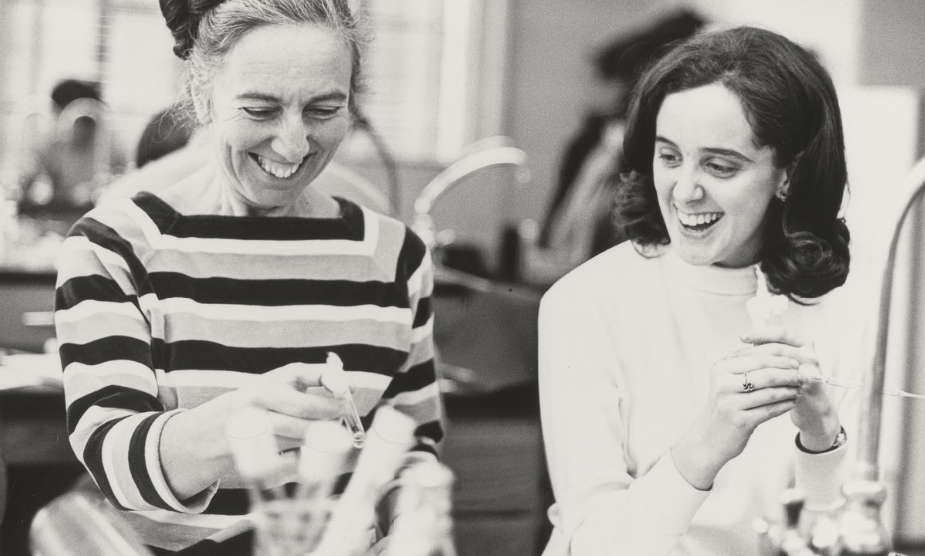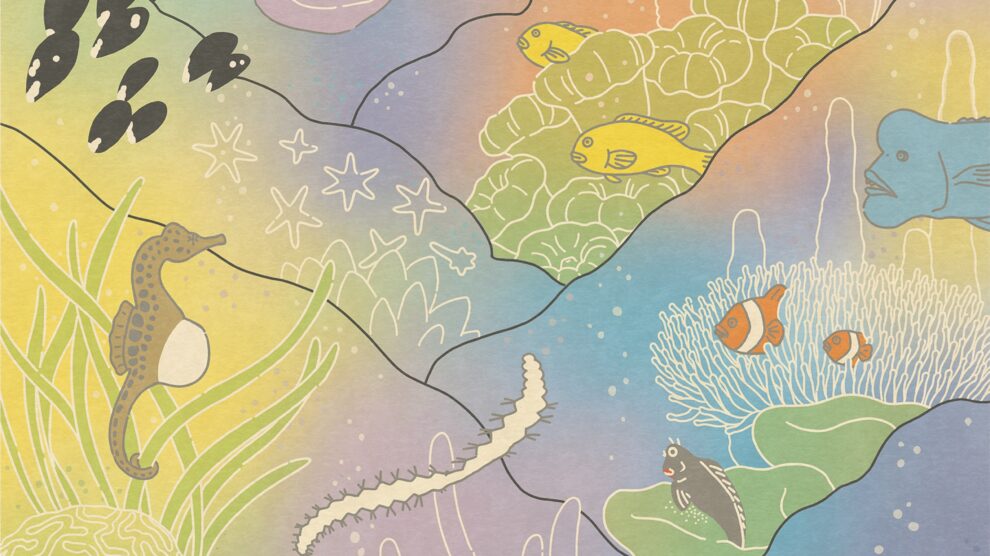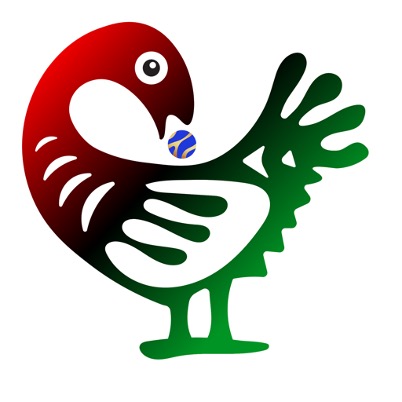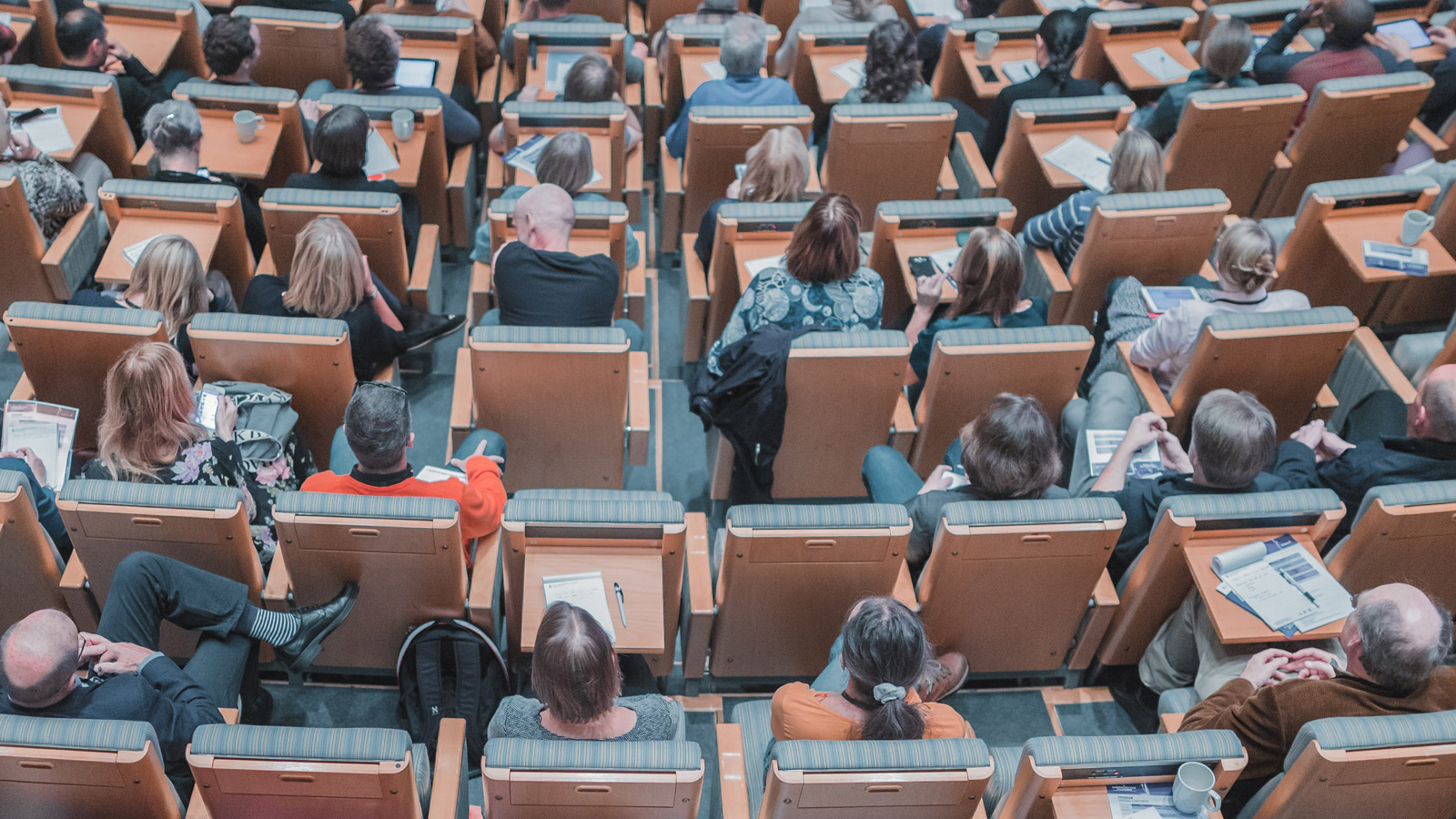Make Ourselves Anew: Towards A Radical Biology
By Kriti Sharma
Volume 23, number 3, Bio-Politics
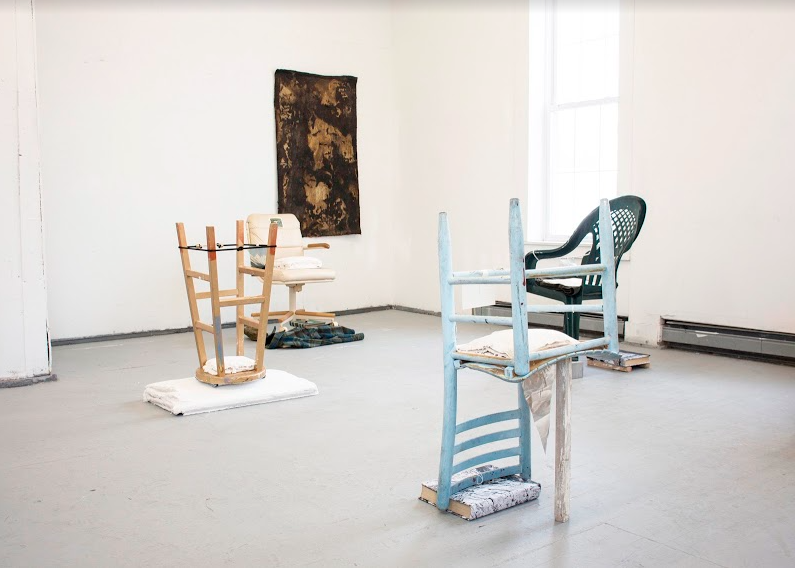
Encuentre una traducción de este artículo en español en nuestro sitio web.
“[Cultural theorist Sylvia] Wynter says we are not Homo sapiens, we are Homo narrans, not the ones who know, but the ones who tell ourselves that we know. She says we therefore have the capacity to know differently. We are word made flesh. But we make words. So we can make ourselves anew.” – Alexis Pauline Gumbs, Dub: Finding Ceremony
Sell your name
A biologist is paid, is held within the circle of the “worthy-of-survival,” in exchange for her name. Become the author: the first, the last, the only. Maybe then you will earn air to breathe. Sell your name. Sell your name or you will not eat, sell your name or you will not eat, sell your name or you will not eat and it will be no one’s fault—just life culling the unfit with no feeling, no meaning, nothing. Nothing personal. It’s nothing at all.
A biologist therefore lives and dies within the very story that she is paid to tell: the one about life and death. The repetitive one where the most interesting thing about living beings is how they acquire enough matter and energy to outcompete others. Where delicate balance sheets are kept between energetic costs and profits. Where careful management of the inner homeostatic world ensures the replication of the well-bounded self. Where ledgers of who owes what to whom—mutualist, parasite, commensal—are obsessively kept. Where the genetic cream rises to the social top. Where nothing is ever given away. Where it is all work and no play. Where one’s only kin are genetic relatives. Where human beings are not creations and not relations nor kinfolk but simply another species of living organism subject to the same impersonal game of survival that is called—simply—life.
Hence: “sell your name or you will not eat.”
Under these conditions, the biologist says: fine, here is my name. I do mind dying. Let me eat. Let me tell a sellable story. Let me sell a tellable story. Let me tell a sellable, tenable story about how organisms gotta eat. How organisms gotta compete, gotta compete to eat and eat to compete, gotta keep the balance sheets balanced, the ledgers accounted, the genetic-kin fed, the insides undead.
If “all writing is autobiography,” then all that is written in the academic discipline of biology is also biography. The author tells the story that the conditions of her own life and labor have made real. The story gets sold in exchange for the necessities of the author’s life. The story becomes the justification for why stories, and names, and lives, become things that can be bought and sold and all.
“But if I am the one telling the Story of Life, in exchange for the necessities of life, because I live in the Story that says I have to sell to survive…then what happens if I tell a different story?”
Towards a Radical Biology
In the summer 2019 relaunch issue of Science for the People, Helen Zhao writes that “a radical analysis must offer lessons for how to transform science in a revolutionary direction.” Further,
Radical critiques of science…distinguish themselves from liberal critiques by the political entanglements they posit among the applications, epistemic features, and material basis of science. Unlike their liberal counterparts, they take for granted that any part of science must be understood through a rich and nuanced grasp of the whole of science across time and place; of the entire knowledge-making industry and its role in capitalism at large. Radical critique is anti-reductionist critique. Radical science is therefore science transformed as a whole.
Taking Zhao’s framework seriously, I have attempted above—albeit, in a schematic and partial way—to draw out the mutual constitution (“entanglements”) of the material conditions in which the contemporary biological sciences are produced with the biological theory that is produced and the application of this theory towards the further reproduction of these very material conditions.
Living in a highly stratified capitalist context coerces the biologist into selling her labor in order to live (material conditions). The repetition of the existing dominant story of life (theory and methodology) becomes the biologist’s means of attempting to gain security under these conditions of precarity, as it is the fastest way to (ostensibly) ensure that she is materially supported (in jobs, funding, prestige, and credibility) within the current institutions. This repetitive story is applied upon the lives of millions and billions of people—justifying and making real everything from hunger to forced sterilization to imprisonment to endless corporate ladder-climbing (to just scratch the surface)—and reinforces the very conditions in which the biologist must hustle to live. This very cycle, in the name of securing the means of life for individual survival and a livable future, in fact degrades the possibility of both individual and collective survival, and steals away a livable future altogether.
In what follows, I offer a few tentative proposals for intervening in and transforming this cyclic system at the level of material conditions, at the level of theory and methodology, and at the level of applications. The analysis of what is to be done is anti-reductionist in that there is no suggestion that interventions at any of these levels is somehow primary. Rather, all of the proposals are offered as possible and mutually entangling sites of intervention on the grounds that a toxic cycle must be broken somewhere, and—ideally, in order to most effectively bring the cycle to cessation—everywhere at once.
Interrupting the loop
The writings of Jamaican cultural theorist Sylvia Wynter and Black feminist poet Alexis Pauline Gumbs offer critical and necessary analyses and undoings of the loop in which the biological sciences are currently caught. As Gumbs reminds us, in a distillation of one of Wynter’s major arguments, the application of biological theory and practice is truly pervasive, ubiquitous, daily: “Police brutality, the destruction of the physical environment, the theft of resources from the so-called developing world, and every other horror of our time are based on a dominant and now-totalizing understanding of what life is, a poetics of the possible.”1
What is this dominant story that so constrains the possible? Briefly, it is the view that life is individual, that it secures itself, and that beings are fundamentally independent of one another. Life can be understood (that is, its essence can be grasped) empirically through experimentation and therefore it can be manipulated and controlled. Moreover, the story says that life is primarily economic—the main problem for living organisms is how they will gather material resources to survive and persist. In this story, as Wynter notes, natural scarcity becomes the overriding obstacle that organisms must overcome—including human beings, who must be saved from natural scarcity through the intervention of “priests” called economists.
The emergence of “Darwinian Man” in the nineteenth century (as Wynter calls him) makes humans just one species among many who obey the same rules as the rest of life, and are naturally selected or “dyselected.” Human lives are vastly differently valued, for the dyselected are seen as “justly excluded from ‘the universe of moral obligation’” by natural law. A eugenicist “biocentric” view of human beings became a dominant and pervasive framework that threads through and unifies all of the major oppressive structures of our time: “our global and nation-state socio-systemic hierarchies are [seen as] the expression, not of the prescriptive categories of our now globalized cultural epistemological model, but of…evolutionarily pre-selected degrees of eugenic ‘worth’ between human groups at the level of race, culture, religion, class, ethnicity, sexuality, and sex.”2 Of course, ability is a central category to add to Wynter’s list, given how central the oppression of people classified as disabled has been to the ideology of “eugenic worth.” Today, these eugenicist ideologies within the biological sciences in their conservative forms (as innate superiority and inferiority) and liberal forms (as neoliberal “meritocratic” processes of justifying the domination of the inferior by the superior) are applied upon millions and billions of people, justifying and making real a world wherein a few lives are immensely valued and hyper-securitized against threat while the majority are profoundly devalued.
There are certainly alternatives to this dominant schema that has laid waste to so many and so much. Life can be seen as manipulable and controllable only in the most temporary and partial ways, vastly excessive of the conceptual schema used to contain life, and of the technologies used to tame it. Living beings live collectively and are interdependent—not only at the level of materials and energies, but at the level of perception, where organisms “bring forth” worlds through their sensory systems, as heterodox Chilean biologists Humberto Maturana and Francisco Varela wrote.3 Wynter took inspiration from Maturana and Varela’s findings to argue that for human beings, narrative works biologically.4 That is, the stories we tell work on us at a neurological and visceral level. What we say about our biological being works on us biologically. By telling the story (for example) that in order to be included within the circle of social care, we must prove that we are superior to those who are “naturally selected against,” we activate habitual neurological responses that make us viscerally feel in our bodies that if we disobey that law, we will die. This same principle, however, suggests that repatterning our responses through creating and telling new narratives can indeed enable us to “make ourselves anew.” It is possible to revalue living beings through narratives and enactments of our kinship, rather than stratified sorting through selection. The antidote to the dominant schema is the abolition of categories—respectable and unrespectable, worthy and unworthy, meritorious and worthless, normal and deviant, fit and unfit—altogether, in their myriad forms.
This means, for one thing, taking the crucial step of no longer applying the principles of eugenicist biology to ourselves, by actively creating new material conditions to support our work as biologists. To put it simply, in order for biologists to be able to tell stories about life that go beyond the notion that life is a relentless struggle for survival, we have to collectively ensure that we will indeed survive. Engaging in collective labor struggles turn us into different beings, who think and act collectively. We are no longer fulfilling the prophecy of self-interested atomism that results from a particular reading of Darwin. As Black feminist poet June Jordan wrote, “Enormous reversals and revisions in our thinking patterns will have to be achieved, somehow, and fast. And to accomplish such lifesaving alterations of society, we will have to deal with power: we will have to make love powerful.” Making love powerful means making it true that people are not “justly excluded from ‘the universe of moral obligation’” by the so-called natural laws of “meritocratic” selection. We have to thoroughly uproot and reject these abhorrent processes of rewarding only a few “winners” of the academic rat race out of the vast many who contribute to the scientific commons. We could collectively dictate our fates through sharing salaries, establishing strike funds, communizing faculty positions and laboratories where resources and decision-making power is democratized, and enacting other creative and diverse means of materially caring for one another. We could thus fully and mutually take the courageous risks necessary to genuinely innovate new narratives and practices for interpreting the living world.
Creating this space collectively is necessary not only as an end unto itself, but also because the work of attending to our world in ways that can genuinely transform our understanding requires great patience and care. Philosopher of science Thomas Kuhn wrote that science changes through paradigm shifts. The paradigm is the prevailing theory of what the natural world is and how it works. Through the course of ordinary research, scientists observe anomalies that don’t fit the current paradigm. These anomalies accumulate slowly, and when enough are accumulated, there emerges a period in which all kinds of new theories are produced to explain the anomalies. Eventually, a new paradigm emerges that explains anomalies that could not be explained under the previous paradigm.
Scientific practice, particularly in the throes of such “paradigm shifts,” requires a radical commitment to being present to a world that is not already understood. We are not putting the finishing touches on a science that has almost worked everything out. Rather, we do not know what life is, how life works, and what survival means. If we did, we would not be frenetically churning out more publications as the world burns. We would neither consciously think nor tacitly, concretely behave as if, as Gumbs writes, “survival means destroying life on Earth.”
The unmaking, reimagining, co-creating of what it means to be living beings (and what it means to be human) can and should happen “within” the biological sciences. But it is already happening everywhere, well “outside” of what is conventionally understood as “biology.” Biologists “within” what is currently and conventionally understood as the discipline of biology could listen to and collaborate with biologists—that is careful students of the living world—everywhere and across disciplines to help make Sylvia Wynter’s prophetic dreams come true. We could unlearn the story of the human being as a type of organism which nature sorts into fit and unfit, better and worse. We could unlearn the story of human beings and organisms generally as primarily defined by the acquisition of material resources, instead of all of the conditions (cultural, spiritual, social, and more) that make life possible. We could immerse our senses in the astonishing materials and relations we have the honor of encountering in the course of biological practices—ocean sediments, subterranean microbes, glaciers—and attend more deeply than ever to what they are saying about what is possible for life beyond our current fears, imaginations, and limitations.
As we listen carefully and narrate what we learn from the beings and materials we engage through the course of our biological practice, our biological findings can become not a resource for capital, military, or the frenzied reproduction of increasingly corporatized universities. Rather, our findings could become resources for each other—each other’s best hope of survival.
Make Ourselves Anew
The aforementioned proposals are far from comprehensive, but the point of this exercise is not to come up with perfect proposals. Rather, it is to suggest the scope, scale, and ambition of the efforts required to transform the biological sciences as a whole, and to open up measures of these scales to imagination and discussion. A radical biology would require daunting and difficult changes at—as it is now clear—multiple, interdependent levels. But these are actions we can take to achieve pervasive effects, and these actions are necessary not only for a more loving, nuanced, and profound biological understanding but also for a hope of a livable future.
The story of life, the science of life, exceeds, precedes, and antecedes its current borders. It has not been, is not, and should not be conceded to the “dominant and now-totalizing understanding of what life is” that passes under the name “Biology.” The flag does not own the territory. The legitimacy of the sovereign is not recognized by amoebas or whales, and it need not be recognized by those of us who labor in its kingdom.5
***
The biologist opens her email, and finds an invitation to a career symposium: “This event allows you to learn how to make yourself a competitive candidate.” Even in the midst of the staggering and compounding crises of the year 2020, her employers still care for her in the only way they know how: by offering her yet another chance to make herself into a person who has acquired enough merit to live.
She skims the email, then deletes it. There is new life possible in such a letting go, new chances for new realities to become reality when (as James Balwin writes in The Fire Next Time) the “guarding and keeping [of one’s] system of reality and what [one] assumes [oneself] to be” is finally given up. The history of life is full of beings taking brave leaps to survive together, huddling together to stay warm, breathing together to change everything. Why would we make ourselves competitive, when we can make ourselves anew?
About the Author
Kriti Sharma, PhD, is a postdoctoral scholar in Geobiology at the California Institute of Technology (Caltech), where she studies microbial life in sediments at the bottom of the ocean, and organizes with Socialists of Caltech. She is the author of Interdependence: Biology and Beyond (Fordham University Press, 2015).
References
- Alexis P Gumbs, Dub: Finding Ceremony (Durham, NC: Duke University Press, 2020).
- Sylvia Wynter, “‘No Humans Involved’: An Open Letter to My Colleagues,” Forum N.H.I.: Knowledge for the 21st Century, 1, no. 1 (1994): 42–73.
- Humberto R. Maturana and Francisco J. Varela, The Tree of Knowledge: the Biological Roots of Human Understanding (Boston: Shambhala, 2008).
- Sylvia Wynter and Katherine McKittrick, “Unparalleled Catastrophe for Our Species?: Or, to Give Humanness a Different Future: Conversations,” in Sylvia Wynter: On Being Human as Praxis, ed. Katherine McKittrick. (Durham, NC: Duke University Press. 2015).
- Michelle Daigle and Margaret Marietta Ramírez, “Decolonial Geographies,” in Keywords in Radical Geography: Antipode at 50 (John Wiley & Sons, Ltd, 2019), 78–84, https://doi.org/10.1002/9781119558071.ch14.


